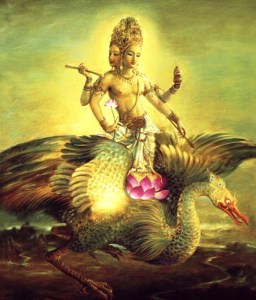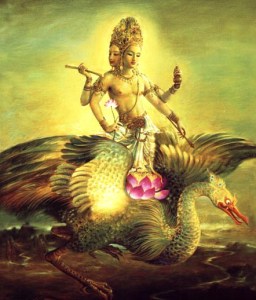Many words are translated into the languages even when the meanings are different. These differences in the meaning lead in the misunderstanding of the concepts of different culture. Here is the word which is most misunderstood:
English God – Sanskrit Dev.
The meaning of God in monotheistic religions is
- The One
- The Creator
- The ruler of the universe
- Source of all moral authority
- Supreme being
- Transcendental
The meaning of Dev in Sanskrit is
- Benevolent supernatural
- Divine
- Heavenly being
- Terrestrial things of high excellence
- Exalted
- Shining one
- Masculine
As Dev is referred as Hindu God, even when the meaning is different from Abrahamic god, which made misunderstanding of the concept of God in Hinduism.
The exact word in Sanskrit for monotheistic God is Nirguna Brahman.
Nirguna Brahman meaning in Sanskrit is
- Brahman without form and qualities
- Transcendental
- Absolute
- Advaita [non-dualistic]
- Unmanifest Reality
Hindu scriptures define Nirguna Brahman as
- Impersonal God who cannot be communicated, who is beyond the mind and the senses, who can be reached only through the inner self.
- Invoking Nirguna Brahman was not an ideal call as he wouldn’t respond to the invocations being impersonal, unmanifested.
- Nirguna Brahman does not communicate with anyone because there is nothing to communicate; everything exists within himself.
- Nirguna Brahman is not worshipped in Hinduism as there is no duality in his absolute state. There is no distinction between the knower and the knowing. or the knower and the known.
- Nirguna Brahman is a state of being in which all dualistic distinctions between one’s own soul and Brahman are obliterated and are overcome.
- Nirguna Brahman is a state of complete knowledge of self as being identical with the transcendental Brahman.
- Nirguna Brahman cannot be worshipped but can be attained only by the self-realization.
Here are some verses from Vedas and Upanishads describe Nirguna Brahman which is taken out of context and misinterpreted by the western missionaries to spread their monolithic opinion.
- Ekam Evadvitiyam Brahman
- Meaning: One without second Brahman.
- Na casya kascij janita na cadhipah:
- Meaning: Of Him, there are neither parents nor lord
- Na tasya pratima asti:
- Meaning: There is no likeness of him.
- Na Sandrse tisthati rupam asya, na caksusa pasyati kas canainam:
- Meaning: His form is not to be seen; no one sees him with the eye.
- Ekam Brahma, Dvitiya naste neh na naste kinchan
- Meaning: There is only one God, not the second; not at all, not at all, not in the least bit.
Above verses are describing Nirgunama Brahman nothing to do with Devas.
Conclusion

- Hindus worship many
godsDevas, as Saguna Brahman [Hindu God] is abstract and inherited in many forms. - Hindus do not worship Nirguna Brahman/monotheistic God, as they aware that an impersonal and unmanifested God neither hear our prayers, nor he knows to respond.
- Hindus do not believe in the concept of a messenger of God or exclusiveness.
- Hinduism is an inclusive religion which believes that all the path of devotion leads to Saguna Brahman.
- Hindustan is a land of seekers not a land of faith.
- Hinduism is based on the practice of Dharma, the code of life.
- The most important aspect of Hinduism is being truthful to oneself.
- Purpose of Life in Hinduism is to achieve Dharma, Artha, Kama, and Moksha. [Not pleasing god]
Note: The word Hindu is used in this post as the believers of Vedas, karma, and Dharma. not on geographical identity.

Leave a comment